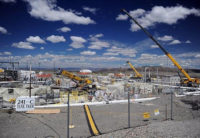Connecticut’s highest court in November rejected the claims of workers seeking lost wages as a result of a 2010 explosion at a power-plant under construction.
The plaintiffs sued owner Kleen Energy Systems and O&G Industries, Torrington, the general contractor for the 620-MW, natural-gas-fired plant in Middletown, Conn. Several other companies involved in the construction also were named in the suit.
An explosion at the Kleen Energy site on Feb. 7, 2010, killed six workers and injured 50 others. The explosion occurred when, as workers used pressurized natural gas to purge debris from pipes, the gas ignited. The plant was nearly complete at the time of the explosion and, since then, has entered into service.
None of the roughly 50 workers who filed the lost-wages suit, Lawrence v. O&G Industries Inc. and Beamer v. O&G Industries Inc., were injured in the blast, but they claimed that their employment was terminated, causing them to suffer “economic loss in the form of past and future wages.”
According to court documents and published reports, the plaintiffs said they were out of work, on average, for two to three months after the explosion and suffered a combined loss of about $1 million. John W. Bradley Jr.‚—an attorney with Rome McGuigan, who represented the defendants—declined to discuss the sums sought but said many of the plaintiffs were not working on the day of the explosion. “Most of them were contract employees, a lot of them working out of the union hall. Some were even hired back” when work on the plant resumed, he noted.
In a 6-0 decision, the court denied the claims for lost wages and said “the defendants, whose alleged negligence caused the explosion at the power plant, did not owe a duty of care to the plaintiffs.”
“Recognizing such a duty would create a new class of plaintiffs, and greatly increase new potential future litigation of similar claims,” the justices wrote, further arguing that it would not bring about “a corresponding increase in the safe operation” of industrial sites. They also argued that case law in most other jurisdictions supports their decision.
If such a duty were to be recognized, the court argued, claims could be made by vendors who profit from the operation of the plant, such as equipment suppliers and servicers, the restaurants at which workers eat or the gas stations at which workers gas up their vehicles.
There has to be personal injury or property damage in order for someone to sue for damages, Bradley explained, adding, “It is basically a nationwide rule.”
An Occupational Safety & Health Administration investigation into the 2010 accident resulted in 370 alleged workplace safety violations and $16.6 million in proposed penalties. The affected companies were able to negotiate settlements that greatly reduced their fines and penalties. O&G’s fine eventually was knocked down by 88%, and the company agreed to pay $1 million to settle the case.
OSHA in August 2010 issued a warning letter on the use of natural gas to purge pipes, but only Connecticut has banned the practice.



